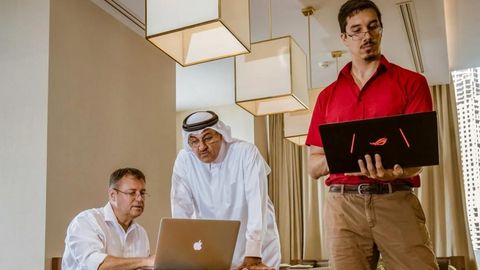Members
ADGS: QF-funded tech uses human behavior to fight cyber-crime

STROKK software aims to combat cyber threats through behavioral biometrics
Read full article on QF website
Qatar could be set to play a leading role in the global battle against cyber-crime – thanks to a homegrown technology funded by Qatar Foundation (QF).
The software, called STROKK, aims to combat data breaches that pose a threat to users of digital tools such as smartphones, tablets, and computers across the globe through the use of behavioral biometrics – such as human-centric technology that analyzes how people type on a computer keyboard, rather than just what they type.
Qatar Science and Technology Park (QSTP), part of Qatar Foundation Research, Development, and Innovation, has supported the Qatari company Application Design for Global Solutions (ADGS), to develop STROKK, which has already been deployed within Qatar in sectors where the risks and repercussions of cyber threats are considered to be high, such as the financial sector.
The software has also been adopted by international banks, and is being tested by some military and defense intelligence services in Europe and South America for potential use.
Added security
STROKK was co-founded by Hassan Al-Ansari, Christophe Billiottet, and a team of engineers directed by an Argentinian expert, Nahuel Gonzalez. Explaining the concept behind it, Billiottet, who has been living in Qatar for nearly a decade, says: “Behavioral biometrics addresses the limitations of biometrics - just as your signature is unique to you, so is the way you type on a keyboard.
“STROKK is a software that learns the way you type and clearly recognizes you from someone else. It adds a security layer to any system, in any language. It even makes stolen passwords useless to hackers by knowing how you type.
“The advantage is that behavior, unlike biometrics, can be consciously changed by the user to eliminate any prospective risks."
Costs and consequences
A 2018 study by IBM revealed that, worldwide, the average cost of a data breach is over USD 3 million, with the US and the Middle East being the most affected areas. An estimate of 4 billion passwords are stolen every year, and 83 percent of the data breaches come from hacked passwords.
“The concerns for privacy and security are perennial issues that companies involved in producing smart devices have to deal with,” says Billiottet. “At the moment, you have solutions based on biometrics, such as fingerprint or facial recognition.
“When these biometrics are being compromised, so is the identity of the user, for biometrics cannot be replaced. And the consequences can be devastating."
Recognizing potential
STROKK was also recently showcased in Kuwait at the third edition of the MENA Dojo, a unique regional accelerator program – organized jointly by QSTP and global venture capital firm 500 Startups – that, through providing tech-based startups with training and mentorship, boosts their chances of securing investment and success. Kuwait was the first country to buy copies of STROKK software from ADGS.
The idea for the software came to Al-Ansari, Billiottet, and Gonzalez four years ago, but they needed financial support to develop it into a product that would achieve their goal of enhancing global data security.
Having heard about QSTP and its role in supporting tech entrepreneurs to transform their ideas into reality, Billiottet and Al-Ansari approached the QF member with a detailed proposal that reflected their product’s purpose. Recognizing the potential of ADGS products, QSTP granted ADGS a grant from its Product Development Fund.
ADGS was also the first beneficiary of QF RDI’s ‘Innovation Coupon’, a fund designed to benefit companies that have the capacity and technical knowledge to develop their product or service, but require more support to resolve a specific technical or business challenge.
Ahead of the game
“It’s only because of the funding we have received through Qatar Foundation that we were able to develop it in a way that allows it to be launched globally, to countries such as Kuwait, Turkey and Algeria, Iraq and Argentina,” says Al Ansari. “Thanks to QF, our algorithms have placed Qatar ahead of countries such as Germany and the US, in improving behavioral biometrics for cyber-security.”
“You can have the best idea in the world, but without time, money and resources, it will remain an idea. Qatar has the capabilities to export technology, just as it does oil and gas. All that remains is for local investors to come forward and support such organic businesses to expand globally.”


